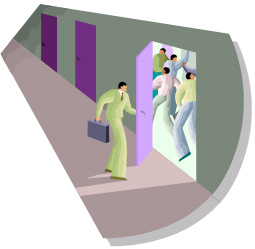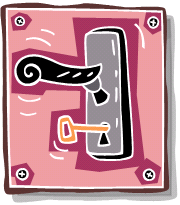The Future of Sales
By Dana Borowka, MA
Not all sales and marketing people are created equal. In a challenging economy, you want to hire people who are creative,  innovative and can get results despite the roadblocks. After all, today is a new day with new opportunities for those that are open to them. To improve hiring decisions, many companies have found out how to crack the personality code by using robust in-depth work style personality testing. Work style assessments are a standard recruiting practice for many branches of the government and military, as well as many Fortune 500 companies when assessing potential hires for key or critical positions.
innovative and can get results despite the roadblocks. After all, today is a new day with new opportunities for those that are open to them. To improve hiring decisions, many companies have found out how to crack the personality code by using robust in-depth work style personality testing. Work style assessments are a standard recruiting practice for many branches of the government and military, as well as many Fortune 500 companies when assessing potential hires for key or critical positions.
Our research for our book, Cracking the Personality Code, reveals that this is not guesswork or an untested science. Here are eight proven ways to use in-depth work style personality testing to hire the right sales and marketing people who are willing to fight for market share.
1. Compare Their Resume Against Your Job Description
Sounds obvious, doesn’t it? Surprising how easy it is to blow right past this step in the hiring process. Past experience alone is not what you are looking for when you review the resume. You are looking at how well they performed, what were their successes, and how adaptable they might be to the job that needs to be done for your organization. Experience is nice, but it is results that really count.
2. Assess Their Problem-Solving Resources
Is this person a problem solver? If so, what kind of problem solver? Each of us has unique problem-solving resources on which we rely. You will want to determine what the person’s strengths are when it comes to problem solving. What are the usual approaches this person will use to resolve these problems?
3. Determine Their Patterns For Coping With Stress
Stress is a force that tends to distort the body, a factor that induces bodily or mental tension, or an automatic physical reaction to a danger or demand in the environment. As one physician stated, “Stress is any demand, either internal, external or both, that causes us to mentally and physically readjust in order to maintain a sense of balance within our life.”
Without a doubt, stress is a fact of life in today’s work world. So determining a candidate’s or employee’s ability to cope with stress is critical for a manager.
4. Examine Their Interpersonal Interaction Styles
Breakdowns in communication are never good for an organization. So take a good look at the individual’s style for relating and communicating with others. How do they usually react in dealing with others? What is their comfort level in interacting and personal connection with others? Personality assessments can tell you the person’s major sources of gratification and satisfaction when building relationships with each other.
This is the time to identify potential red flags. A personality assessment can discover issues that are sometimes overlooked during the traditional interviewing process and can quantify a hunch or feeling the interviewer may have about a particular candidate. Knowing interpersonal interaction styles can also help understand how to manage individuals for greater work performance. A comparison of the interpersonal dynamics of teams, departments, employees and candidates is well worth the effort.
a hunch or feeling the interviewer may have about a particular candidate. Knowing interpersonal interaction styles can also help understand how to manage individuals for greater work performance. A comparison of the interpersonal dynamics of teams, departments, employees and candidates is well worth the effort.
5. Analyze Career Activity Interests
Certain personality tests help you gain information which may either support the person’s present career choices or assist them to explore, consider and plan for another career direction. This is not to say you will be recommending another career choice to someone you are considering hiring or currently managing. Rather, you are using this information to determine fit. All organizations want to ensure that they have the right people in the right positions and effectively distribute these human assets and talents.
6. Assess How They Respond To Tests
You should also use tests with scales for what is known as “impression management.” This is necessary in order to understand the accuracy of results and whether someone is trying to “fake good” or misrepresent themselves. A critical element in predicting a potential candidate’s success is measuring real personality and style in an interview. An in-depth work style and personality assessment presents a fairly accurate picture of a candidate’s personality, work style and fit within a company’s culture.
If a profile does not have an impression management scale, then it is difficult to tell how accurate the data is. A profile needs to have at least 165 questions in order to gather enough data for this scale. Otherwise you will have no idea of the picture you are getting from an assessment.
7. Chronicle Strengths & Weakness Ledger
Benjamin Franklin reportedly had a decision-making process when he was faced with important challenges. Franklin divided a sheet of paper into two columns, and on the left side listed the reasons for doing something and on the right side the reasons against. Much like a bank ledger with credits and debits, this simple tool greatly aided the analysis of information. Often a quick scan of the two lists gave him the information he needed to make the right choice.
We recommend you do the same for the personality of a job candidate or an employee under your supervision. Like a bank ledger, every credit should have a corresponding debit. That is because for every strength a person possesses there is a corresponding weakness. Being assertive is a strength; however, that personality can be too assertive and off putting for some people they deal with.
8. Create Personality Probing Interview Questions
So, what have you learned about the job candidate so far through personality assessments? What remains to learn? To find out, developinterview questions that probe facets of the personality you need more details on
 Forget those old standby questions like, ‘Tell me about your strengths and weaknesses’. Instead, let’s say you wanted to determine how they cope with stress. You might ask the candidate to give an example of when they made a terrible mistake and how they handled it. Ask them how they think others perceive them when they are under stress. For making a mistake, did they blame others or take responsibility for the outcome? Listen for their process. Do they ask for help? Watch body language and tone of voice to see how much insecurity the candidate expresses at the idea of making a mistake or having stress..
Forget those old standby questions like, ‘Tell me about your strengths and weaknesses’. Instead, let’s say you wanted to determine how they cope with stress. You might ask the candidate to give an example of when they made a terrible mistake and how they handled it. Ask them how they think others perceive them when they are under stress. For making a mistake, did they blame others or take responsibility for the outcome? Listen for their process. Do they ask for help? Watch body language and tone of voice to see how much insecurity the candidate expresses at the idea of making a mistake or having stress..
As consultants trained in psychology, this is something we help our clients create for new candidates. To help you create questions, here are some preliminary interview questions for a candidate. Naturally, these are not meant to be questions to ask all candidates, but are indicative of the types of questions you might ask:
What process do you think helps you to learn? Give an example of how you learn a very complex system or skill and what your process was?
How would you handle a situation that brought up many different changes? How do you like to see change take place? Give an example when change was implemented and it just didn’t work out.
Have you ever worked with individuals who are abstract thinkers? How did you deal with that kind of thought process?
Give an example of when you have had to make an exception to the guidelines or rules. How have you handled that?
What was the most challenging sales situation you have ever faced and won? Give an example of when you lost a sale and what you could have done differently.
Whew, seems like a lot to worry about. As with any business decision, having and organizing the right information is critical. Work style and personality assessment testing can  provide insight into potential hires, as well as the current workforce. The trick is to gather the information and then look at it in an organized fashion.
provide insight into potential hires, as well as the current workforce. The trick is to gather the information and then look at it in an organized fashion.
If you would like additional information on this topic or others, please contact your Human Resources department or Lighthouse Consulting Services LLC, Santa Monica, CA 90403, (310) 453-6556, dana@lighthouseconsulting.com & our website: www.lighthouseconsulting.com
Dana Borowka, MA, CEO of Lighthouse Consulting Services, LLC and his organization constantly remain focused on their mission statement – “To bring effective insight to your business”. They do this through the use of in-depth work style & personality assessments to raise the hiring bar so companies select the right people to reduce hiring and management errors. LCS can test in 19 different languages, provide domestic and international interpersonal coaching and offer a variety of workshops – team building, interpersonal communication, stress & time management, sales & customer service training and negotiation skills as well as our full-service Business Consulting Division. Dana has over 30 years of business consulting experience and is a nationally renowned speaker, radio and TV personality on many topics. He is the co-author of the books, “Cracking the Personality Code”, “Cracking the Business Code” and “Cracking the High-Performance Team Code”. To order the books, please visit www.lighthouseconsulting.com.
Lighthouse Consulting Services, LLC Divisions
Testing Division provides a variety of services, including in-depth work style & personality assessments for new hires & staff development. LCS can test in 19 different languages, skills testing, domestic and international interpersonal coaching and offer a variety of workshops – team building, interpersonal communication.
Business Consulting for Higher Productivity Division provides stress & time management workshops, sales & customer service training and negotiation skills, leadership training, market research, staff planning, operations, ERP/MRP selection and implementation, refining a remote work force, M&A including due diligence – success planning – value creation and much more.
Permission is needed from Lighthouse Consulting Services to reproduce any portion provided in this article. © 2024







